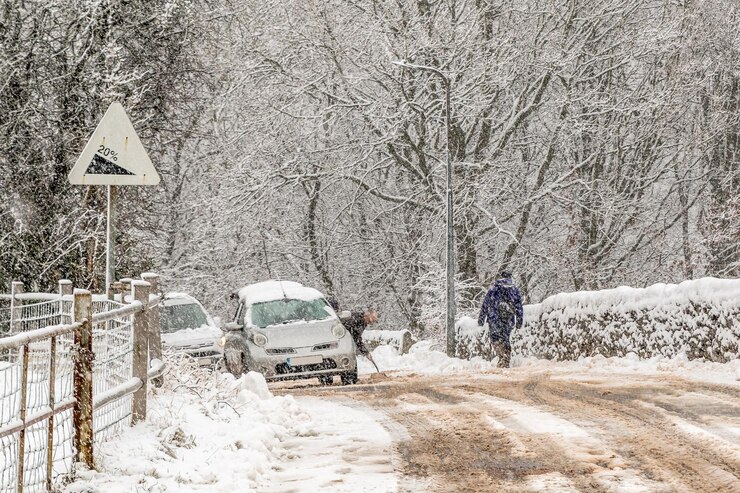
Snow, ice, and freezing temperatures can turn routine towing tasks into daunting endeavors. Winter towing causes a unique set of challenges that demand a higher level of preparation and care. As the season blankets the landscape with snow and ice, tow truck operators and recreational towers alike need to be well-equipped to navigate the treacherous roads.
In this blog, we’ll delve into the importance of winter towing preparedness and provide a detailed guide on handling snow, ice, and extreme cold weather when towing. We’ll also offer expert tips to ensure a safe and successful winter towing experience.
Looking for a winter tow truck service? Count on SPN America Roadside Network!
The Importance of Winter Towing Preparedness
Here’s how you can get prepared for towing your vehicle in winter season:
- Safety First: Prioritize safety above all else when towing in winter, as adverse conditions can quickly lead to accidents and mishaps.
- Vehicle Reliability: A well-maintained vehicle ensures that you have the power, control, and dependability needed to navigate icy and snowy roads safely.
- Towing Equipment: Equip your vehicle with snow chains, ice grips, and essential tools to tackle any unexpected challenges winter may bring.
- Weather Variability: Winter weather can be unpredictable, so staying prepared allows you to adapt to changing conditions on the go.
- Reduced Visibility: Snow and ice can limit your field of vision, necessitating extra care and attention while towing in winter.
- Emergency Readiness: Carrying a toolkit, blankets, and non-perishable food can be a lifesaver in case of unexpected winter emergencies.
- Expertise: Mastering winter towing techniques is vital, as they differ from standard towing practices due to the unique challenges winter presents.
- Local Weather Knowledge: Understanding local weather patterns and forecasts helps you plan your winter towing trips with greater safety and success.
Towing in Snowy Conditions
Snow and ice are the chief adversaries when it comes to winter towing. Understanding how to cope with these elements is vital to a smooth towing operation. Let’s explore how to handle each of these challenges.
Adjusting Your Speed and Following Distance
When towing in the snow, reducing your speed and increasing your following distance is key. It takes longer to stop on slippery roads, so maintaining a safe distance from the vehicle in front of you is crucial.
Utilizing Snow Chains and Traction Aids
Snow chains provide the necessary grip to prevent wheel spin on snowy roads. Traction aids like sand or cat litter can also be handy in situations where you find yourself stuck.
Clearing Snow from Your Vehicle
Before hitting the road, ensure your vehicle is free from snow and ice. Snow buildup can obstruct your view and create hazardous conditions, especially when towing.
Towing in Icy Conditions
Dealing with Black Ice
Black ice, a nearly invisible layer of ice on the road, can be exceptionally dangerous. To combat it, invest in studded tires or ice grips, which offer improved traction.
Using Studded Tires and Ice Grips
Studded tires and ice grips are specifically designed for icy conditions. They can greatly enhance your vehicle’s grip on slippery surfaces.
Read: “Advantages of Hiring a Local Towing Service”
Cold Weather and Its Impact
Extreme cold can have detrimental effects on your vehicle. To ensure a safe journey, it’s essential to understand how cold weather can affect your towing operation.
Maintaining Your Vehicle’s Engine in Low Temperatures
Proper Oil and Coolant
Using the correct grade of oil and ensuring your vehicle’s coolant mixture is appropriate for low temperatures is crucial to keep your engine running smoothly.
Battery Care
Cold weather can drain your battery quickly. Ensure your battery is in good condition, and keep a set of jumper cables in case of emergencies.
Safe Towing Practices in Extreme Cold
To tackle extreme cold, it’s essential to observe safe towing practices.
Inspecting Your Brakes
Cold weather can affect your braking system. Regularly inspect your brakes and ensure they’re in excellent working condition.
Keeping Fuel Tanks Full
In extremely cold conditions, it’s wise to keep your fuel tanks full to prevent freezing.
Emergency Preparedness
Even with the best preparation, emergencies can still happen during winter towing. Being well-prepared can make all the difference.
Carrying Necessary Tools
Always carry a toolkit that includes items like a flashlight, a set of wrenches, and a first aid kit.
Having Emergency Provisions
Emergency provisions like non-perishable food, blankets, and warm clothing can be a lifesaver if you’re stranded in cold weather.
Expert Tips for Winter Towing Success
Succeeding in winter towing requires a combination of knowledge, experience, and preparedness. Here are some expert tips to enhance your winter towing skills.
Knowledge of Local Weather Conditions
Understanding the local weather patterns and forecasts is vital for planning your towing trips in winter.
Visibility and Lighting
Proper lighting and visibility are essential when towing in low-light conditions. Ensure your vehicle’s lights are working correctly.
Why SPN America Roadside for Winter Towing
SPN America Roadside Network is the trusted choice for winter towing for several compelling reasons. With a strong commitment to customer-first service, advanced technology, and a broad network of service providers, it ensures a seamless experience for those navigating the challenges of winter roads.
Our cutting-edge technology and omnichannel communication enable rapid response times and real-time updates, essential for handling winter-related emergencies.
We offer a comprehensive range of towing services, including luxury and motorcycle towing, designed to cater to diverse needs.Our focus on transparency and cost-effectiveness means you get the best value for your winter towing needs.
Conclusion
Winter towing is a challenging yet rewarding endeavor. By being well-prepared and following safe towing practices, you can ensure a successful journey, even in the harshest winter conditions. Remember that safety should always be your top priority.
